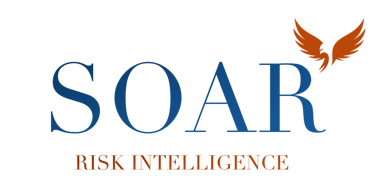GO BEYOND RISK MANAGEMENT
Risks in Focus 2025 for Financial Institutions
Critical, Complex, Evolving, Disruptive, Pervasive
It is crucial for financial institutions to identify and mitigate the top risks that could impact their stability and growth in 2025. Understanding and managing these risks will enable them to enhance their resilience, ensure regulatory compliance, and maintain stakeholder trust.
Risks In Focus 2025
Cybersecurity Threats
The increasing frequency and sophistication of cyber-attacks pose a significant risk to financial institutions. Cyber threats can lead to data breaches, financial loss, and operational disruptions. Protecting sensitive information and maintaining robust cybersecurity measures are essential to prevent such incidents.
Risk Intelligence Approach: Invest in advanced cybersecurity measures, conduct regular security assessments and penetration tests, educate employees on cybersecurity best practices.
Digital Disruption
Rapid advancements in technology, such as artificial intelligence, blockchain, and fintech innovations, are transforming the financial services landscape. These disruptions can create both opportunities and threats, necessitating that institutions stay ahead of technological changes to remain competitive and secure.
Risk Intelligence Approach: Invest in research and development, collaborate with fintech firms and technology providers, stay updated with emerging technological trends.
Talent Management
Attracting, retaining, and developing skilled employees is essential for maintaining a competitive edge. Talent shortages and high turnover rates can lead to operational inefficiencies and increased costs. Ensuring a robust talent management strategy is critical to fostering a skilled and motivated workforce.
Risk Intelligence Approach: Develop comprehensive talent acquisition strategies, invest in employee development programs, foster a positive workplace culture to enhance retention
Regulatory Compliance
As regulations evolve, financial institutions must ensure adherence to new laws and standards. This includes anti-money laundering (AML) measures, data protection regulations like GDPR, and other compliance requirements. Failure to comply can result in significant fines and legal consequences, impacting the institution’s financial health and reputation.
Risk Intelligence Approach: Implement robust compliance programs, regularly update policies to align with regulatory changes, and conduct periodic audits and training.
Market Changes/Competition
Financial institutions face constant pressure from market changes and increased competition. Emerging fintech companies, evolving customer preferences, and innovative financial products can disrupt traditional banking models. Institutions need to adapt to these changes to stay competitive and meet customer demands.
Risk Intelligence Approach: Monitor market trends and competitor activities, innovate and diversify product offerings, enhance customer experience and engagement.
Macroeconomic and Geopolitical Uncertainty
Global economic trends and geopolitical tensions can influence market conditions, interest rate fluctuations, and financial stability. Factors such as trade wars, economic sanctions, and shifts in global economic power can lead to volatility in financial markets, impacting investment returns and operational stability.
Risk Intelligence Approach: Monitor global economic indicators, develop flexible business strategies, establish contingency plans for geopolitical events
Potential Impact
The potential impact of these risks varies widely but can include financial losses, reputational damage, operational disruptions, and regulatory penalties. Addressing these risks proactively can help financial institutions avoid significant negative consequences and capitalize on opportunities for growth and innovation.
Key Takeaways
The financial services industry in 2025 will face an array of complex risks. By focusing on these risks, financial institutions can enhance their resilience and ensure sustainable growth. Proactive risk intelligence strategies will be essential in navigating these challenges and securing a competitive advantage in the evolving financial landscape.


Disclaimer
This content is meant for information only.
Why SOAR Risk Intelligence...
Apply Risk Intelligence and gain resilience, create new capabilities, and capitalise on opportunities faster and effectively in your risk management oversight. Our team of experts can assist you in strengthening, developing, and transforming the way you manage risks by applying international best practices, advanced analytics, and artificial intelligence in an ever-evolving business landscape.
